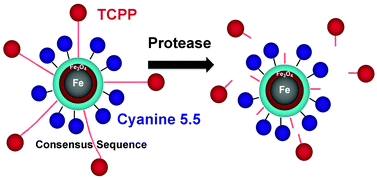Nanoplatforms for highly sensitive fluorescence detection of cancer-related proteases†
Abstract
Numerous proteases are known to be necessary for cancer development and progression including matrix metalloproteinases (MMPs), tissue serine proteases, and cathepsins. The goal of this research is to develop an Fe/Fe3O4 nanoparticle-based system for clinical diagnostics, which has the potential to measure the activity of cancer-associated proteases in biospecimens. Nanoparticle-based “light switches” for measuring protease activity consist of fluorescent cyanine dyes and porphyrins that are attached to Fe/Fe3O4 nanoparticles via consensus sequences. These consensus sequences can be cleaved in the presence of the correct protease, thus releasing a fluorescent dye from the Fe/Fe3O4 nanoparticle, resulting in highly sensitive (down to 1 × 10−16 mol l−1 for 12 proteases), selective, and fast nanoplatforms (required time: 60 min).

- This article is part of the themed collection: Dedicated to the memory of Prof. Nicholas J. Turro

 Please wait while we load your content...
Please wait while we load your content...